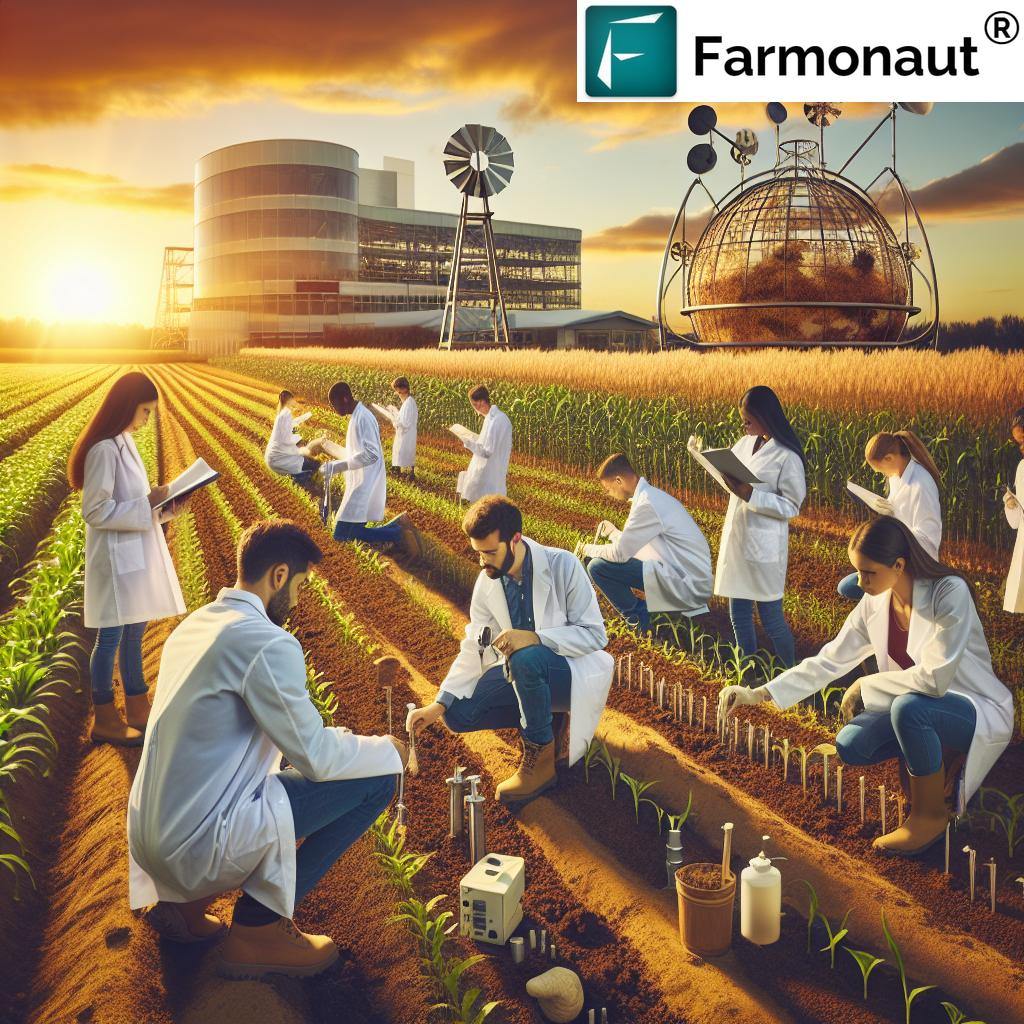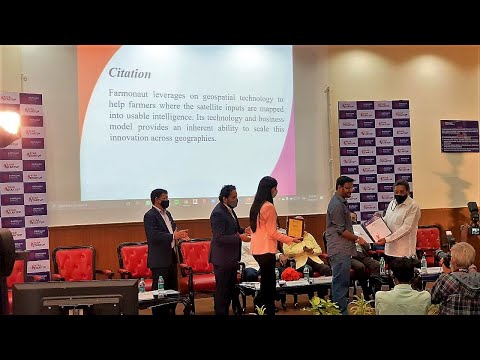Advancing Soil Science: Prestigious Travel Awards for Students in Agricultural Research and Education
“Over 90% of soil physics student travel award recipients present groundbreaking research at annual conferences, advancing sustainable farming initiatives.”
In the ever-evolving landscape of agricultural science and technology, we at Farmonaut recognize the critical importance of nurturing the next generation of soil scientists and agronomists. As we delve into the world of prestigious soil physics student travel awards, we aim to shed light on the invaluable opportunities these scholarships provide for aspiring researchers in the field of soil science and sustainable agriculture.

The Significance of Soil Physics Student Travel Awards
Soil physics student travel awards play a crucial role in fostering innovation and academic excellence in the field of agronomy. These prestigious scholarships not only provide financial support but also offer unique opportunities for students to present their groundbreaking research at annual conferences, engage with industry leaders, and contribute to the advancement of sustainable farming initiatives.
As we explore the landscape of soil science awards, it’s important to note that these opportunities align closely with our mission at Farmonaut to make precision agriculture accessible and affordable. While we focus on providing cutting-edge satellite-based farm management solutions, we also recognize the importance of supporting the academic community that drives innovation in this field.
Explore Farmonaut’s innovative solutions:
Understanding the Impact of Soil Physics Research
Soil physics research forms the backbone of modern agricultural practices, influencing everything from crop yield optimization to sustainable resource management. The importance of this field cannot be overstated, especially in the face of global challenges such as climate change and food security.
- Enhancing crop productivity through improved soil management techniques
- Developing sustainable irrigation strategies based on soil hydrology
- Mitigating soil erosion and preserving soil health for future generations
- Optimizing nutrient cycling and reducing the environmental impact of agriculture
These areas of research directly contribute to the advancement of precision agriculture, a field where Farmonaut is actively involved through our satellite-based crop health monitoring and AI-driven advisory systems.
The Role of Travel Awards in Academic Development
Travel awards serve as a catalyst for academic and professional growth in the field of soil science. By enabling students to attend conferences and present their research, these awards foster:
- Networking opportunities with leading experts in the field
- Exposure to cutting-edge research and methodologies
- Development of presentation and communication skills
- Cross-pollination of ideas across different agricultural disciplines
At Farmonaut, we understand the value of such exposure, as it aligns with our commitment to integrating innovative technology with traditional farming practices. While we focus on providing technological solutions, we recognize the importance of academic research in driving the future of agriculture.
Exploring Prominent Soil Physics Student Travel Awards
Let’s take a closer look at some of the most prestigious soil physics student travel awards available to aspiring agronomists and soil scientists:
| Award Name | Sponsoring Organization | Eligibility Criteria | Award Amount (estimated) | Application Deadline | Conference/Event Attendance | Research Focus Areas |
|---|---|---|---|---|---|---|
| Soil Physics and Hydrology Travel Award | Soil Science Society of America | Graduate students in soil physics or hydrology | $800 | May 15 | Annual SSSA Meeting | Soil physics, hydrology, water management |
| Francis and Evelyn Clark Soil Biology Scholarship | Soil Science Society of America | Undergraduate or graduate students in soil biology | $1000 | March 31 | ASA-CSSA-SSSA Annual Meeting | Soil microbiology, biochemistry, ecology |
| L.R. Ahuja Ag Systems Modeling Award | American Society of Agronomy | Graduate students in agricultural systems modeling | $1500 | June 1 | ASA Annual Meeting | Agricultural systems modeling, crop simulation |
| ISRIC – World Soil Information Travel Grant | ISRIC – World Soil Information | Early-career scientists from developing countries | €1500 | Varies | International soil science conferences | Soil mapping, digital soil assessment |
| EGU Roland Schlich Travel Support | European Geosciences Union | Early career scientists, particularly from low-income countries | Up to €300 | December 1 | EGU General Assembly | Soil science, geosciences |
These awards represent just a fraction of the opportunities available to students in the field of soil science and agronomy. Each award offers unique benefits and focuses on different aspects of soil research, providing a diverse range of options for students to pursue their academic interests.
The Application Process: A Step-by-Step Guide
Applying for soil physics student travel awards can be a competitive process. Here’s a general guide to help students navigate the application journey:
- Research Available Awards: Start by identifying awards that align with your research interests and eligibility criteria.
- Prepare Your Research Abstract: Craft a compelling abstract that clearly outlines your research objectives, methodology, and potential impact.
- Gather Supporting Documents: Collect necessary documents such as transcripts, letters of recommendation, and your CV.
- Write a Strong Personal Statement: Articulate your research passion and how the award will contribute to your academic and professional goals.
- Review and Submit: Carefully review all application materials for accuracy and completeness before submitting.
- Follow Up: After submission, follow up with the awarding organization to ensure your application has been received.
Remember, the key to a successful application lies in demonstrating not only your academic excellence but also your potential to contribute meaningfully to the field of soil science.
The Importance of Soil Hydrology in Modern Agriculture
“Soil hydrology studies in modern agriculture have increased by 40% in the last decade, driven by climate change challenges.”
Soil hydrology, a critical subset of soil physics, plays an increasingly important role in modern agriculture. As climate change continues to alter precipitation patterns and water availability, understanding the movement and retention of water in soil becomes paramount for sustainable farming practices.
At Farmonaut, we recognize the significance of soil hydrology in precision agriculture. Our satellite-based soil moisture monitoring capabilities complement the groundbreaking research being conducted in this field. By providing farmers with real-time data on soil moisture levels, we enable more efficient water management and irrigation practices.
Soil Science Technology: Bridging Academia and Industry
The rapid advancement of soil science technology is creating exciting synergies between academic research and practical applications in agriculture. As students and researchers push the boundaries of soil physics knowledge, companies like Farmonaut are translating these insights into actionable tools for farmers.
Some key areas where soil science technology is making a significant impact include:
- Precision soil mapping and characterization
- Advanced sensor technologies for real-time soil monitoring
- Machine learning algorithms for soil health prediction
- Integration of soil data with crop growth models
These technological advancements not only enhance our understanding of soil processes but also contribute to more sustainable and efficient farming practices. At Farmonaut, we’re proud to be at the forefront of this technological revolution, offering farmers access to cutting-edge soil monitoring tools through our satellite-based platform.
Explore Farmonaut’s API for developers: Farmonaut API
Learn more about our API capabilities: API Developer Docs
The Role of Research Funding in Advancing Soil Science
Research funding is the lifeblood of scientific advancement in soil physics and agronomy. Travel awards, while crucial for student development, are just one part of a broader ecosystem of research support. Adequate funding enables:
- Long-term soil monitoring projects
- Development of innovative soil analysis techniques
- Collaborative research initiatives across institutions
- Investment in state-of-the-art laboratory equipment
As we at Farmonaut continue to innovate in the field of agricultural technology, we recognize the immense value that well-funded academic research brings to the industry. The insights gained from these studies often form the foundation for practical applications in precision agriculture.
Sustainable Agriculture Initiatives: From Research to Practice
The ultimate goal of soil physics research and the associated travel awards is to drive sustainable agriculture initiatives. As students present their findings at conferences and collaborate with peers, they contribute to a growing body of knowledge that shapes farming practices worldwide.
Some key areas where soil physics research is influencing sustainable agriculture include:
- Conservation tillage practices
- Precision fertilizer application
- Soil carbon sequestration techniques
- Drought-resistant crop development
At Farmonaut, we’re committed to bridging the gap between research and practice. Our AI-based advisory system, Jeevn AI, incorporates the latest scientific findings to provide farmers with personalized recommendations for sustainable crop management.
The Future of Soil Physics Research: Emerging Trends
As we look to the future, several exciting trends are emerging in the field of soil physics research:
- Integration of Big Data and AI: Leveraging large datasets and machine learning algorithms to predict soil behavior and crop responses.
- Nanotechnology in Soil Science: Developing nano-sensors for ultra-precise soil monitoring and remediation.
- Microbiome-Centric Approaches: Understanding and harnessing the power of soil microorganisms for improved soil health and crop productivity.
- Climate-Resilient Soil Management: Developing strategies to adapt soil management practices to changing climatic conditions.
- Soil-Plant-Atmosphere Continuum Modeling: Creating comprehensive models that simulate the entire ecosystem for more accurate predictions and management decisions.
These emerging trends align closely with Farmonaut’s mission to advance precision agriculture. Our ongoing development of satellite-based monitoring and AI-driven advisory systems aims to incorporate these cutting-edge research areas into practical tools for farmers.
Career Paths in Soil Science and Agronomy
For students pursuing soil physics and related fields, a wide array of career opportunities awaits. The skills and knowledge gained through academic research and travel award experiences can lead to diverse and rewarding career paths:
- Academic Research and Teaching
- Government Agencies (e.g., USDA, EPA)
- Environmental Consulting
- Agricultural Technology Companies
- International Development Organizations
- Precision Agriculture Specialists
- Soil Conservation Officers
At Farmonaut, we value the expertise of soil scientists and agronomists in developing our advanced farm management solutions. While we don’t directly hire for all these roles, we recognize the importance of a strong academic foundation in driving innovation in agricultural technology.
The Global Impact of Soil Science Education
Soil science education and research have a far-reaching impact on global agriculture and environmental sustainability. By supporting student travel awards and research initiatives, we contribute to:
- Addressing food security challenges in developing nations
- Mitigating the effects of climate change on agriculture
- Preserving biodiversity through sustainable land management
- Improving water quality and conservation efforts
- Enhancing global agricultural productivity
At Farmonaut, we’re proud to play a role in this global effort by providing farmers worldwide with access to advanced agricultural technology. Our commitment to making precision agriculture affordable and accessible aligns with the broader goals of soil science education and research.
Farmonaut’s Contribution to Agricultural Advancement
While Farmonaut is not directly involved in academic research or awarding scholarships, our innovative technologies complement and support the work of soil scientists and agronomists. Here’s how our services contribute to the advancement of agriculture:
- Satellite-Based Crop Health Monitoring: Providing real-time data on vegetation health and soil moisture, enabling researchers to validate their findings on a large scale.
- AI-Driven Advisory Systems: Incorporating the latest research findings into practical recommendations for farmers, bridging the gap between academic knowledge and on-field application.
- Blockchain-Based Traceability: Enhancing transparency in agricultural supply chains, which can be valuable for researchers studying the impact of different soil management practices on crop quality.
- Carbon Footprint Tracking: Supporting research on sustainable agriculture by providing data on emissions and environmental impact.
By offering these advanced tools, we aim to support the broader ecosystem of agricultural research and education, complementing the valuable work being done by recipients of soil physics student travel awards and other researchers in the field.
Conclusion: Nurturing the Future of Soil Science
As we’ve explored throughout this article, soil physics student travel awards play a crucial role in advancing agricultural research and education. These prestigious opportunities not only support individual students but also contribute to the broader goals of sustainable agriculture and global food security.
At Farmonaut, we’re excited to be part of this dynamic field, offering innovative solutions that complement academic research and support farmers in implementing sustainable practices. While we focus on providing cutting-edge technology, we recognize and applaud the invaluable contributions of soil scientists, agronomists, and students who are shaping the future of agriculture through their research and dedication.
As we look to the future, the collaboration between academic research, industry innovation, and on-field application will be key to addressing the complex challenges facing global agriculture. By supporting and nurturing the next generation of soil scientists through travel awards and research opportunities, we’re investing in a more sustainable and productive agricultural future for all.

Frequently Asked Questions (FAQ)
- What are soil physics student travel awards?
Soil physics student travel awards are scholarships that provide financial support to students studying soil science, enabling them to attend conferences and present their research. - Who is eligible for these travel awards?
Eligibility varies by award but generally includes graduate students studying soil physics, hydrology, or related fields in agronomy. - How can students apply for these awards?
Students typically need to submit a research abstract, CV, and sometimes a personal statement. Specific requirements vary by award. - What benefits do these awards provide?
Benefits include financial support for conference attendance, networking opportunities, and the chance to present research to experts in the field. - How do these awards contribute to sustainable agriculture?
By supporting student research and knowledge sharing, these awards drive innovation in sustainable farming practices and soil management techniques. - What role does soil hydrology play in modern agriculture?
Soil hydrology is crucial for understanding water movement in soil, which is essential for efficient irrigation and water management in agriculture. - How does Farmonaut support soil science research?
While Farmonaut doesn’t directly fund research, our satellite-based monitoring and AI advisory systems complement academic research by providing real-world data and practical applications. - What career opportunities are available in soil science?
Careers include academic research, environmental consulting, government agencies, agricultural technology, and more. - How is technology changing soil science research?
Technology is enabling more precise soil mapping, real-time monitoring, and the integration of big data and AI in soil analysis and management. - Where can I find more information about soil physics student travel awards?
Check with professional organizations like the Soil Science Society of America, university departments, and international soil science conferences for award opportunities.
Explore Farmonaut’s Subscription Options






